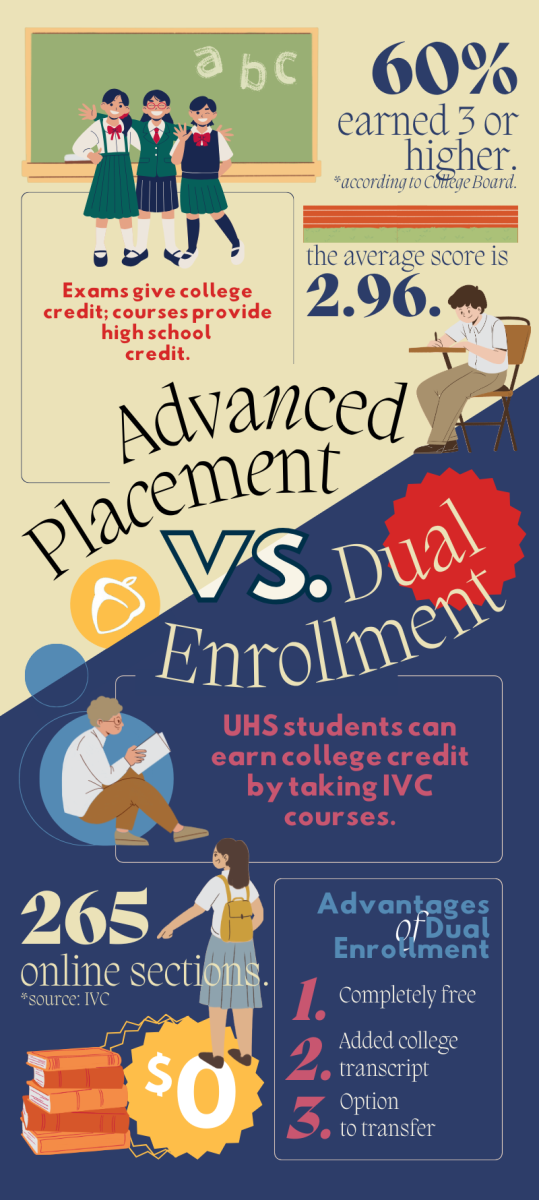*The opinions expressed within the content are solely the author’s and do not reflect the website’s or its affiliates’ opinions and beliefs.”
College is hard. From the admissions process to the excruciating workload, college is a very difficult period for most students. One way that students try to stand out during the college admissions process is by overloading themselves with AP classes. Students take these classes to prove to colleges that they can do well with a college workload, making colleges more likely to accept that student.
While there is some logic in this way of thinking, there are many things that could be improved with the AP Curriculum. For starters, your understanding of the class depends on a standardized test. Similar to how the SAT is being phased out due to inequality among students, AP Exams are in a similar situation. According to a report by CSU Monterey, “Standardized testing has shown to increase test anxiety in young students, decrease student self-confidence, and put pressure on students to perform well for their teachers. Students and teachers are both suffering from this method of educational assessment, but there are multiple better alternatives to help resolve this issue.”
One alternative to AP classes is taking Dual Enrollment classes through a community college. Many high schools offer some programs where students can take classes at no additional charge through a community college. For example, University High School has an agreement with Irvine Valley College, where UHS students can take IVC classes free of charge (excluding fees and materials costs).
The benefits of taking dual enrollment classes include a flexible schedule, earning more college credit and getting a true college experience. With many IVC classes being offered in an online, or hybrid (HY-FLEX) format, students can log onto Zoom online and attend the brief class. There is no need to spend time going to class or waiting for class to start; you can do it from the comfort of your own home. In addition, IVC offers many self-paced courses that allow you to work on your schedule, and just hop on a Zoom call if you need help.
Additionally, when you take an IVC class through Dual Enrollment, it will show up on your IVC transcript. There are various benefits to this, including being able to submit a college and high school transcript with your application and getting credit through IVC to graduate sooner. While you can also do this in select AP classes, many schools require a perfect score for credit, if they even accept college credit. According to the Progressive Policy Institute, “Only 25 percent of the schools in this study allow students to receive credit in all AP subject area disciplines. The [remaining 75 percent] eliminate some subject areas from consideration.”
In comparison, IVC offers classes that give students college credit for passing with a C or above. Usually, these credits are UC and CSU transferable and they will go toward your Gen. Ed. requirements, meaning you can graduate sooner and transfer to a well-known four-year college or university.
According to Appily, “Dual Enrollment allows high school students to begin undergraduate classes for credit. Unlike Advanced Placement (AP) classes, which award credit based on a [standardized] test, dual enrollment courses award credit as long as the student passes the class.”
Furthermore, taking classes at IVC gives you a college class experience, which is significantly different from the AP experience. As someone who has been previously enrolled in, and is currently enrolled in both AP classes and Dual Enrollment classes, I can attest that Dual Enrollment is a true college-like experience. It teaches you responsibility for your actions, as professors no longer harass you to do your work, as seen in AP classes. It is also more flexible, as you can complete the work by a deadline, instead of having work split up and due every day.
This prepares you for the true college experience and allows you to build better college skills. It also allows you to form connections with professors while still in high school, which is useful for college and your professional career.
Some claim that AP classes are more convenient for students as they are on campus and are built into the school schedule. While this argument has some validity, there are numerous flaws as well. For example, some schools offer Dual Enrollment classes on campus as part of the regular schedule. Additionally, as mentioned above, since IVC classes are typically very flexible, many students would prefer to take one less class throughout the school year and instead allot some of their own time to the completion of an IVC class.
In conclusion, Dual Enrollment classes are a better alternative to College Board Advanced Placement classes, and should seriously be considered by all high school students.












